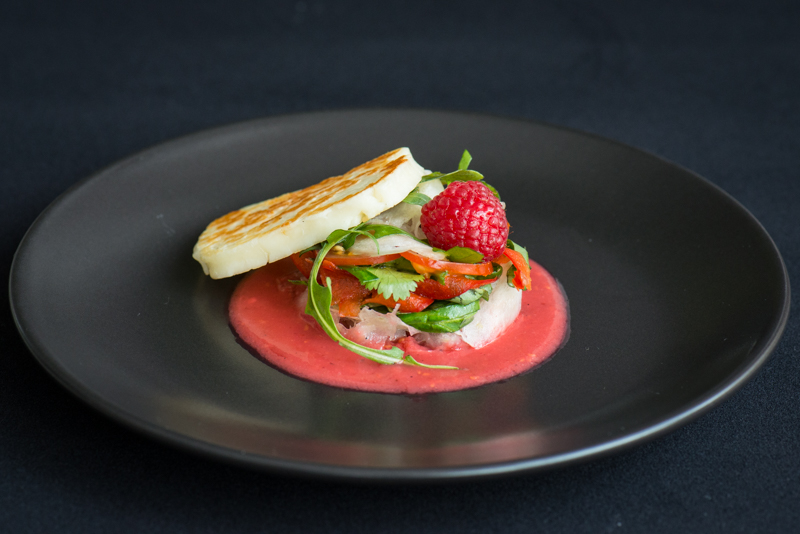Halloumi cheese, Cyprus’ celebrated grilled cheese specialty, has captivated taste buds around the globe with its unique flavor, distinctive texture, and remarkable versatility. Originating from the beautiful Mediterranean island of Cyprus, Halloumi is renowned for its remarkable ability to maintain its shape even when grilled or fried, delivering deliciously crisp edges and a soft, slightly chewy interior. In this article, we’ll uncover the fascinating history, traditional preparation methods, and contemporary culinary uses of Cyprus’ iconic Halloumi cheese.
A Brief History of Halloumi Cheese

Halloumi’s story dates back hundreds of years, deeply embedded in the culinary heritage of Cyprus. While precise origins remain debated, historical records trace Halloumi production back to the Byzantine era. Traditionally crafted by rural Cypriot families, Halloumi was primarily produced from a combination of sheep and goat milk, becoming an essential dietary staple due to its durability and nutritional value.
Over centuries, Halloumi transitioned from humble local farms into global culinary prominence, ultimately becoming one of Cyprus’ most famous exports and culinary ambassadors worldwide.
What Makes Halloumi Unique?
The secret behind Halloumi’s distinctive character lies in its production method and ingredients. Traditional Halloumi combines goat, sheep, and occasionally cow milk, heated and curdled before being pressed, folded, and stored in brine. This process yields Halloumi’s unique layered structure, salty flavor, and resilient texture.
Unlike most cheeses, Halloumi boasts an unusually high melting point. This unique property allows it to be grilled, fried, or sautéed without losing its shape, resulting in delightful caramelized crusts with a slightly springy interior.
Traditional Preparation Methods
Traditionally, crafting Halloumi cheese involved specific artisanal techniques passed down through generations:
-
Milk heating and curdling: Fresh milk is gently heated and curdled using natural enzymes.
-
Shaping and folding: Curds are collected, pressed, and shaped into characteristic folded blocks.
-
Cooking and brining: Blocks are simmered in whey or salted water before being stored in brine, enhancing flavor and preserving freshness.
This method contributes directly to Halloumi’s unique taste, saltiness, and distinctive texture, setting it apart from other cheeses worldwide.
Grilled Halloumi: A Cypriot Delicacy
Grilled Halloumi is perhaps the cheese’s most celebrated preparation, beloved for its crispy exterior and soft interior. Cypriots traditionally grill or pan-fry Halloumi slices until golden, often pairing them with fresh tomatoes, mint leaves, olive oil, and lemon juice.
The cheese’s natural salty tang beautifully complements Mediterranean salads, vegetables, grilled meats, or enjoyed simply as an appetizer. Its savory aroma and appealing texture make grilled Halloumi a staple at Cypriot dining tables, tavernas, and street food stalls.
Modern Culinary Uses and Global Popularity
Halloumi has achieved remarkable international popularity, becoming a favorite ingredient among chefs worldwide. Modern culinary trends embrace Halloumi’s versatility, featuring it in diverse dishes such as:
-
Vegetarian burgers: Replacing traditional patties with grilled Halloumi slices for a satisfying alternative.
-
Wraps and sandwiches: Incorporating Halloumi alongside fresh vegetables, herbs, and sauces for flavorful lunches.
-
Salads: Pairing grilled Halloumi with leafy greens, quinoa, fruits, or nuts, adding a delicious protein component.
-
Breakfast dishes: Serving fried Halloumi slices with eggs, avocado, or toast for hearty, savory breakfasts.
This adaptability has made Halloumi highly sought after globally, appealing to vegetarians, cheese enthusiasts, and culinary adventurers alike.
Halloumi’s Nutritional Benefits
Halloumi cheese not only delights taste buds but also provides nutritional benefits:
-
High in protein: A valuable protein source, essential for muscle development and maintenance.
-
Rich in calcium: Supports strong bones and dental health.
-
Good source of healthy fats: Provides necessary dietary fats beneficial to overall well-being.
However, due to its higher sodium content, moderation is advisable for individuals monitoring salt intake.
Sustainability and Protected Status
To protect traditional Halloumi production methods, the European Union granted Halloumi PDO (Protected Designation of Origin) status in 2021. This designation ensures authenticity, specifying that genuine Halloumi must be produced exclusively in Cyprus using traditional methods and ingredients.
The PDO status benefits Cypriot farmers, safeguards culinary heritage, and assures consumers worldwide of Halloumi’s quality and authenticity.
Innovative Culinary Trends and Variations
Creative culinary trends continue to reshape Halloumi’s presence in modern cuisine. Innovations include:
-
Halloumi fries: Crisp-fried Halloumi strips served with dipping sauces.
-
Halloumi pizza: Incorporating Halloumi slices atop pizzas as a gourmet alternative to mozzarella.
-
Fusion dishes: Combining Halloumi with global flavors, such as Asian-inspired salads, Middle Eastern mezze platters, or Tex-Mex tacos.
These contemporary variations introduce Halloumi to new audiences, showcasing the cheese’s impressive versatility and culinary adaptability.
Cultural Importance in Cyprus
Halloumi remains deeply significant within Cypriot culture, embodying hospitality, tradition, and identity. Served during family gatherings, festivals, and celebrations, Halloumi symbolizes generosity and warmth. Local festivals even honor the cheese, highlighting Halloumi’s central role in Cypriot cultural and social life.
Conclusion
Halloumi cheese perfectly captures Cyprus’ culinary spirit—delicious, distinctive, and adaptable. Its journey from humble village farms to global gourmet menus reflects the cheese’s unique appeal and enduring bosjoko popularity. Whether grilled, fried, or creatively adapted into contemporary dishes, Halloumi remains a beloved Cypriot treasure, continually delighting food lovers worldwide.




